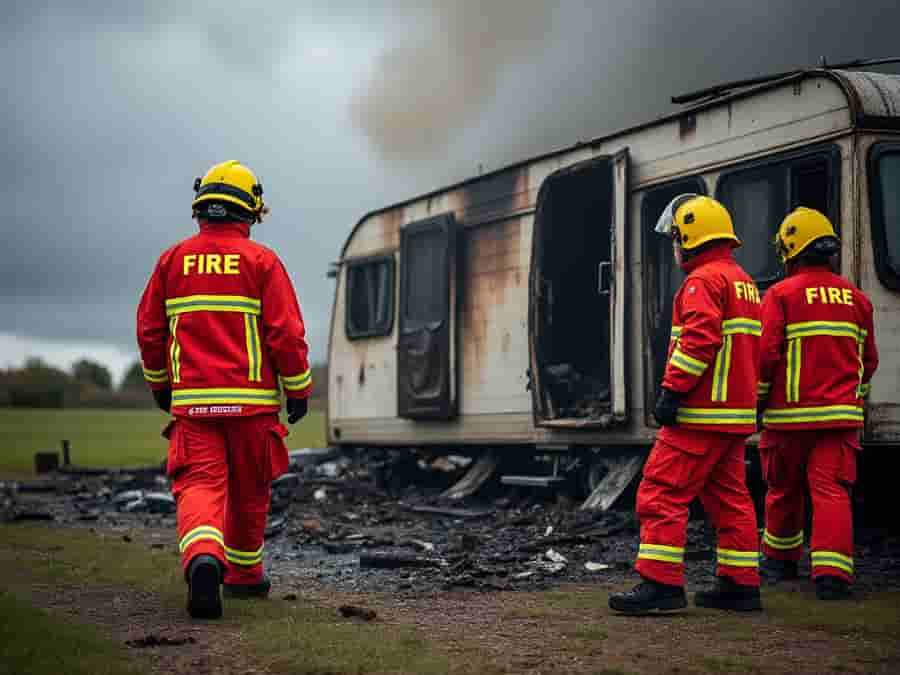In a tragic incident that underscores the unique risks faced by workers living away from home, an inquest has concluded that 24-year-old Ryan Savage, a worker from Blackpool who travelled to Devon for a job, died accidentally following a catastrophic fire in the caravan he was staying in. The inquest, held in Exeter, revealed that Mr. Savage, who had been hired to help build the Sherford new town, succumbed to smoke inhalation after a blaze engulfed his temporary accommodation at Butlas Farm in Plympton.
Details of the Incident
The fatal incident occurred shortly after 1 p.m. on March 26, 2022. Emergency services responded to reports of a caravan on fire and rushed to the scene. Unfortunately, by the time they arrived, the fire had already intensified beyond control, making it impossible for rescuers to reach Mr. Savage in time. Witnesses included Brian Hughes, the employer and owner of the adjacent caravan, who described his harrowing attempt to rescue Mr. Savage. Mr. Hughes, who had employed Mr. Savage on a subcontract basis as a dumper driver construction worker, was the first on the scene and desperately tried to save him, but was driven back by the intensity of the smoke and flames.
According to Mr. Hughes, he noticed smoke emanating from the caravan’s vents and saw that the structure was beginning to deform from the heat. Despite his best efforts, he was unable to enter the caravan due to a “wall of thick, black acrid smoke.” Mr. Hughes then worked to minimize the risk of further escalation by moving nearby gas cylinders out of harm’s way and called emergency services.
Inquest Findings
The inquest shed light on Mr. Savage’s final days and activities, confirming that he had no known issues or intentions that could explain the tragedy. Mr. Savage was known to have been in high spirits, adjusting well to his work in Devon and maintaining regular communication with his family up until the day of the fire. On the evening prior, he had gone out locally in Plympton, and the next morning shared his plans to work on his car with Mr. Hughes. His last known communication was a text message exchange with his brother around midday.
An investigation into the cause of the fire identified several potential ignition sources but could not confirm a definitive cause. Possible triggers included a discarded cigarette, faulty electrical equipment, or clothing left too close to an electric heater. However, the investigation ruled out any involvement of third parties, concluding that the fire was an unfortunate accident. A post-mortem examination confirmed that Mr. Savage’s death was due to the inhalation of smoke and hot, toxic gases. The examination also found traces of alcohol, cocaine, and prescribed medication in his system, though it remains unclear if he was awake, dozing, or sleeping at the time the fire started.
Living and Working Away from Home: The Complexities for Mobile Workers
Mr. Savage’s death is a tragic reminder of the unique vulnerabilities faced by workers living and working away from home, often in temporary or makeshift accommodations. For many, staying in caravans or similar lodgings near construction sites is a necessary arrangement, reducing the burden of daily travel and allowing them to focus on their demanding roles. However, these living conditions may lack the robust safety measures of more permanent housing, leaving workers more exposed to hazards, especially in remote or industrial areas where emergency response times may be slower.
The inherent risks of living in caravans or other temporary accommodations are multifaceted. Issues with electrical systems, heating sources, and fire safety standards are common concerns. In some cases, equipment and appliances may not meet the rigorous health and safety requirements upheld in standard residential environments, increasing the likelihood of accidents. For many workers, especially those contracted to distant locations, these risks are part and parcel of the job. This tragedy has reignited conversations about enhancing health and safety at work protocols and fire prevention measures for workers in temporary housing.
Importance of Safety and Awareness for Workers and Employers
This incident highlights the need for greater awareness and preventive measures in the accommodation provided for mobile workers. Employers and site managers may wish to review the safety protocols governing temporary worker housing, ensuring that electrical equipment is in sound condition, heating systems are adequately maintained, and fire safety measures are robust. Safety awareness training for workers, especially those unfamiliar with the potential risks of temporary accommodations, could also play a critical role in preventing similar tragedies.
In this case, Mr. Hughes expressed confidence that the caravan and its amenities were in working order, but the incident emphasizes the need for regular workplace safety checks and maintenance. Employers may also consider facilitating access to smoke detectors, fire extinguishers, and easily reachable emergency contacts in such living quarters to enhance safety.
The Workers Union says…
“As families, friends, and colleagues mourn the loss of Mr. Savage, his story serves as a sobering reminder of the challenges that accompany remote or mobile work arrangements. The Workers Union extends its condolences to Mr. Savage’s loved ones and encourages all involved in worker safety to continue advocating for improvements, particularly for those operating away from home. The inquest’s conclusion of accidental death provides a measure of closure, yet it also reinforces the need for constant vigilance and heightened safety standards in all worker accommodations. Moving forward, The Workers Union hopes this tragic event will spark further dialogue and action to protect the welfare of workers across the UK.”




